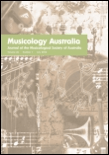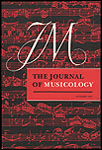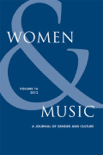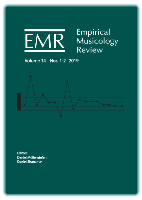
Musicology Australia
Scope & Guideline
Bridging Tradition and Contemporary Sound
Introduction
Aims and Scopes
- Indigenous and Cultural Musicology:
The journal emphasizes the study of Indigenous Australian music, exploring its historical significance, contemporary practices, and the role it plays in cultural identity and revitalization. - Historical and Contextual Studies:
A significant focus on historical musicology, analyzing various musical forms and practices within specific cultural and historical contexts, including colonial influences and the evolution of music in Australia. - Interdisciplinary Approaches:
The journal adopts interdisciplinary methodologies, incorporating perspectives from sociology, anthropology, and cultural studies to provide a comprehensive understanding of music's role in society. - Performance and Reception Studies:
Exploration of performance practices and audience reception, examining how music is experienced and interpreted across different communities and settings. - Music and Identity:
Investigating how music shapes and reflects personal and collective identities, including the impact of migration, diaspora, and multicultural influences in the Australian music scene.
Trending and Emerging
- Language Revitalization and Music:
Recent publications highlight the integration of language revitalization efforts with musicology, particularly Indigenous languages, showcasing the importance of music in cultural preservation and identity. - Impact of COVID-19 on Musical Practices:
There is an increasing focus on how the COVID-19 pandemic has affected musical practices and community engagement, illuminating the resilience and adaptability of musicians and cultural organizations during challenging times. - Exploration of Australian Music Identity:
A growing trend in examining the unique identity of Australian music, including its historical roots and contemporary expressions, reflects a deepening interest in national identity and cultural narratives. - Interdisciplinary and Cross-Cultural Studies:
An emerging emphasis on interdisciplinary research that combines musicology with other fields such as sociology, anthropology, and cultural studies, indicating a broader approach to understanding music's role in society. - Women in Music:
There is a noticeable increase in research focusing on the contributions of women to music, both historically and in contemporary contexts, reflecting a broader movement towards gender equity in the arts.
Declining or Waning
- Traditional Western Classical Music:
There has been a noticeable decrease in studies focused solely on traditional Western classical music, indicating a shift towards more diverse and inclusive musical narratives that encompass a wider range of genres and cultural expressions. - Nostalgia in Music Studies:
Themes centered around nostalgia, particularly in the context of historical music practices, seem to be less prevalent, possibly overshadowed by a focus on contemporary issues and the relevance of music in current societal contexts. - Music and Industrialization:
While historical studies of music's relationship with industrialization have been important, this theme appears to be emerging less frequently, as the journal shifts towards exploring more immediate cultural and social issues. - Eurocentric Perspectives:
There is a declining emphasis on Eurocentric musicological perspectives, as the journal increasingly prioritizes diverse voices and narratives, particularly those from Indigenous and non-Western contexts.
Similar Journals

MUSICAL TIMES
Empowering the Next Generation of Music ScholarsMUSICAL TIMES is a distinguished journal dedicated to the exploration and dissemination of scholarly works in the realm of music, serving as an essential resource for researchers, professionals, and students alike. Published by MUSICAL TIMES PUBLICATIONS LTD, this journal has built a robust reputation within the arts and humanities, specifically focusing on music studies, with an impactful reach indicated by its Scopus ranking at #73 out of 106 in the field. Though access to this journal is not open, its curated content, which spans various facets of musicology and contemporary music discourse, enriches the academic community by encouraging insightful discussions and critical analyses. With its historical roots tracing back to its inception, MUSICAL TIMES aims to foster a deeper understanding of music's cultural, social, and artistic dimensions, making it a valued publication for those engaged in the scholarly pursuit of music.

JOURNAL OF MUSICOLOGY
Pioneering Insights into Contemporary and Historical MusicJOURNAL OF MUSICOLOGY, published by UNIV CALIFORNIA PRESS, stands as a premier academic forum for the exploration and dissemination of research in the field of musicology. With an ISSN of 0277-9269, this journal provides a vital platform for scholars, practitioners, and educators to engage with contemporary and historical music studies. The journal, which has been publishing significant works since 1982 and continues through to 2024, boasts a commendable Q2 ranking in Music and holds a notable position within the 68th percentile of Scopus rankings for Arts and Humanities, specifically in Music. Although it does not offer open access, the journal remains a crucial resource for those dedicated to advancing the understanding of musical heritage, theory, and practice. The JOURNAL OF MUSICOLOGY aims to foster interdisciplinary dialogue and promote innovative methodologies within the field, thereby making it an essential read for all engaged in the scholarly pursuit of music.

Women and Music-A Journal of Gender and Culture
Empowering Voices Through Music and Gender StudiesWomen and Music: A Journal of Gender and Culture is a pioneering academic journal published by University of Nebraska Press, focusing on the intersection of gender and music. With a commitment to exploring issues pertinent to women and music in a range of cultural contexts, this journal provides a critical platform for scholars, musicians, and educators to share research that enriches our understanding of gender dynamics within the music industry and music's role in society. While currently not an open-access journal, it aims to make significant contributions to gender studies, cultural studies, and musicology, attracting a dedicated readership from various backgrounds. The journal is essential for those interested in feminist musicology and gender representation in the arts, fostering discourse that challenges traditional narratives and promotes inclusive scholarship. By bringing together diverse perspectives and innovative research, Women and Music continues to push boundaries and foster important conversations within both academic and artistic communities.

Vestnik Sankt-Peterburgskogo Universiteta-Iskusstvovedenie
Unveiling Insights into Cultural Heritage and CreativityVestnik Sankt-Peterburgskogo Universiteta-Iskusstvovedenie, published by ST PETERSBURG UNIV PRESS, is a distinguished academic journal based in the Russian Federation, focusing on the interconnected disciplines of Conservation, History, Music, and Visual Arts and Performing Arts. With an ISSN of 2221-3007 and E-ISSN of 2542-2243, this journal plays a vital role in disseminating scholarly research and fostering dialogue across these fields. Despite being categorized in the third quartile (Q3) in 2023 across its respective disciplines, its significance lies in publishing emerging research and critical analyses that contribute to the academic discourse. The journal accepts submissions until the converged years spanning 2016 to 2024, making it a relevant platform for current academic inquiry. Although it currently does not offer open access, the journal provides robust insights for researchers, professionals, and students eager to explore the nuances of cultural heritage and artistic expression. As it continues to develop its impact within the arts and humanities, Vestnik Sankt-Peterburgskogo Universiteta-Iskusstvovedenie remains an essential resource for those passionate about understanding and preserving the rich tapestry of artistic endeavors.

Empirical Musicology Review
Bridging Theory and Practice: Where Musicology Meets MethodologyEmpirical Musicology Review is a pioneering journal in the field of musicology, published by the Ohio State University School of Music. Established as an open access journal since 2006, it aims to foster interdisciplinary research by providing a platform for scholars to disseminate empirical studies and analyses related to music. With ISSN 1559-5749, this journal plays a crucial role in expanding the understanding of music through methodological rigor and innovative practices, catering to researchers, professionals, and students alike. By promoting the accessibility of high-quality research, Empirical Musicology Review significantly contributes to the evolving landscape of music studies and enhances the global dialogue surrounding music's theoretical and practical dimensions. The journal's commitment to open access ensures that its valuable insights reach a broad audience, encouraging further exploration and collaboration within the musicology community.

MUSIKTHEORIE
Catalyzing Insights in Music Composition and HistoryMUSIKTHEORIE is a pivotal journal dedicated to the field of music theory, published by LAABER-VERLAG. With its ISSN 0177-4182, this journal serves as an essential platform for scholars, educators, and practitioners interested in the multifaceted dimensions of music theory. Although it does not currently offer open access, it provides in-depth analyses and critical discourse on theoretical frameworks, compositional techniques, and historical perspectives in music. Despite its coverage in Scopus being discontinued after 2018 and ranking within the 5th percentile of Arts and Humanities - Music, MUSIKTHEORIE remains a respected publication for advancing knowledge and fostering collaboration within the musicological community. Researchers and students alike can benefit from its rich content and the insights shared within its pages.

LIED UND POPULARE KULTUR-SONG AND POPULAR CULTURE
Connecting Melodies to ModernityLIED UND POPULARE KULTUR-SONG AND POPULAR CULTURE, published by WAXMANN VERLAG GMBH, is a unique interdisciplinary journal that delves into the rich interconnections between song and popular culture, facilitating discourse among researchers, professionals, and students interested in cultural studies and musicology. With ISSN 1619-0548, this prestigious journal serves as a crucial platform for scholarly analysis, critical reviews, and innovative research exploring various facets of popular music and cultural expressions in Germany and beyond. Although classified in the 2023 Scopus category quartiles as Q4 in both Cultural Studies and Music, the journal maintains an essential role in fostering engagement and reflection on evolving cultural practices. Although it is not available as Open Access, articles from the journal have previously contributed valuable insights and shaped the conversation on popular culture from its inception in 2002 to its recent issues in 2023. Researchers will find this journal particularly relevant for its focus on underrepresented voices and themes within the cultural landscape.

Musicology Today
Connecting Scholars and Trends in Music ResearchMusicology Today, published by SCIENDO, is a pivotal journal in the field of musicology, presenting a platform for scholars, researchers, and practitioners to disseminate their findings and engage with current trends in music research. With its ISSN 1734-1663 and E-ISSN 2353-5733, the journal aims to provide a comprehensive overview of various aspects of music, including theory, history, and ethnomusicology, fostering a multidisciplinary dialogue among its contributors. Located in Warsaw, Mazovia, Poland, this journal is not only committed to high academic standards but also to promoting open access to knowledge, thereby enhancing accessibility for a global audience. As it continues to bolster its reputation in the academic community, Musicology Today plays an essential role in shaping the future of music scholarship and invites the engagement of seasoned researchers and emerging voices alike.

HUDEBNI VEDA
Pioneering Insights into the World of MusicHUDEBNI VEDA is a distinguished journal published by the Czech Academy of Sciences Press, specializing in the field of music. With its ISSN 0018-7003 and E-ISSN 2694-6998, this journal serves as a vital platform for scholarly communication in music studies, promoting innovative research and critical discourse. Since its inception in 2002 and scheduled for continuation until 2024, it has emerged as a respected publication within the music academic community, though currently holding a Category Quartiles ranking of Q4 in Music. Notably, it ranks #127 out of 180 in the Scopus Arts and Humanities - Music category, placing it in the 29th percentile. While it operates under traditional access constraints, HUDEBNI VEDA is committed to fostering an inclusive academic environment, inviting contributions that push the boundaries of musicology. This journal is essential for researchers, professionals, and students eager to explore and engage with contemporary issues and developments in the study of music.

RIVISTA ITALIANA DI MUSICOLOGIA
Diving Deep into the World of MusicologyRIVISTA ITALIANA DI MUSICOLOGIA, published by the Italian Society of Musicology, is a distinguished journal dedicated to the field of musicology, offering a platform for scholarly research and discourse on a wide array of musical topics. With an ISSN of 0035-6867 and an E-ISSN of 2036-5586, this journal has contributed significantly to the understanding of music in cultural and historical contexts. Although the scope of coverage was marked from 2003 to 2008 in renowned databases like Scopus, the journal continues to serve as an invaluable resource for researchers, educators, and students embroiled in music studies. Its emphasis on rigorous research and critical analysis makes it a vital asset for anyone seeking to deepen their knowledge of musicological inquiry. While not an open-access publication, the RIVISTA ITALIANA DI MUSICOLOGIA remains a prestigious outlet for scholarly contributions that reach audiences eager to explore the complexities of musical heritage.